Community Dental Health

- Cover Date:
- June 2017
- Print ISSN:
- 0265 539X
- Vol:
- 34
- Issue:
- 2
Caries prevalence and treatment needs in young people in Portugal: the third national study
Objective: To evaluate caries prevalence and dental treatment needs in Portuguese children and teenagers, as well as fluorosis prevalence in 12-year-old children, in order to address public oral health program strategies. Participants: A representative stratified random cluster sample of 3,710 participants of 6, 12, and 18 years old was selected. A questionnaire was applied to determine sociodemographic data and some oral health determinants. The clinical examination was based on the ICDAS criteria, then adapted to DMFS index, and Dean’s index for fluorosis. Results: Caries prevalence at 6, 12, and 18 years old was 45.2%, 47.0%, and 67.6%, respectively. D5MFT scores were 1.18 (SD 0.06) and 2.51 (SD 0.10), respectively. Treatment needs at 12 and 18 years old were associated with 0.37 (SD 0.03) and 0.75 (SD 0.06) values in the “decayed†(D5) variable. SiC index at 12 years old was 2.68 (SD 1.68). Sealants were identified in 55% of 12-year-old children and the mean of sealants per individual was 3.61; also, moderate (2.2%) and severe (0.2%) levels of fluorosis were detected. Conclusions: The oral health situation in Portugal is favorable for young people, resulting in low treatment needs. The National
Oral Health Promotion Program should be extended to include 18-year-olds.
Key words: epidemiology, dental caries, fluorosis, oral health, oral health promotion, national survey, children, adolescents, Portugal
doi:10.1922/CDH_4016Calado05
- Article Price
- £15.00
- Institution Article Price
- £
- Page Start
- 107
- Page End
- 111
- Authors
- R. Calado, C.S. Ferreira, P. Nogueira, P. Melo
Articles from this issue
- Title
- Pg. Start
- Pg. End
- Communities in action: developing a dental ambassador training programme for adults with learning disability
- 77
- 79
- Public health intervention over four decades for the children in the Australian Capital Territory: Have we reached the point of diminishing returns?
- 84
- 87
- Relationship between mental health risk factors and oral symptoms in adolescents: Korea Youth Risk Behavior Webbased Survey, 2013
- 88
- 92
- PeP-SCOT a health coaching intervention for people in prisons: the development of the intervention protocol
- 97
- 101
- Productive efficiency and its determinants in the Community Dental Service in the north-west of England
- 102
- 106
- Socio-demographic and area-related factors associated with the prevalence of caries among preschool children in Greece.
- 112
- 117
- Dental caries experience, rather than toothbrushing, influences the incidence of dental caries in young Japanese adults
- 118
- 121
